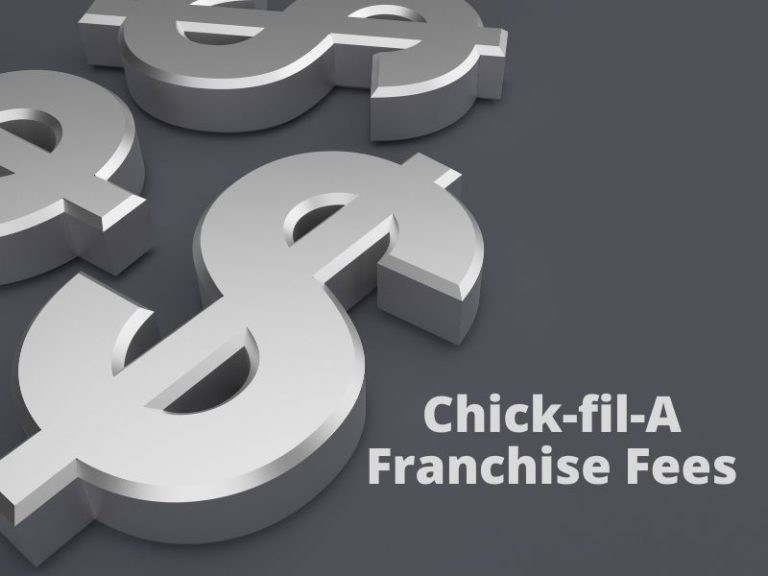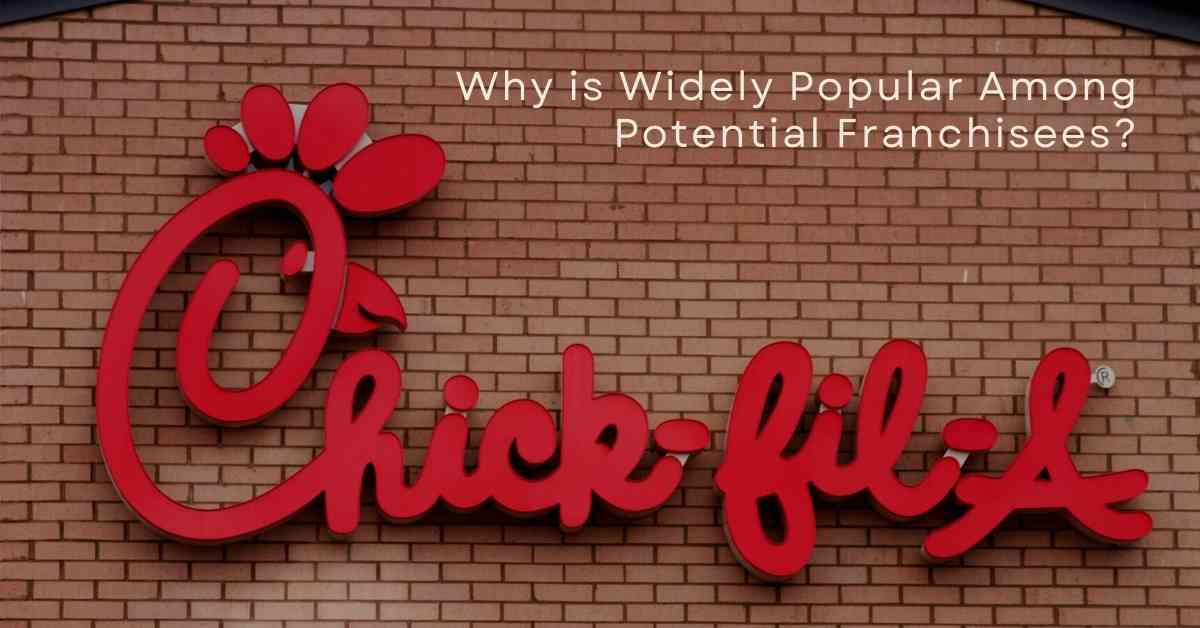Chick-fil-A stands as a beloved icon in the realm of fast-food chains, renowned for its delectable chicken sandwiches and irresistible waffle fries. While the allure of its menu items often steals the spotlight, there’s a lesser-known aspect that deserves attention: the remarkably low Chick-fil-A franchise fees.
Consider this: While launching a McDonald’s franchise demands a hefty investment in the millions, the entry fee for a Chick-fil-A franchise hovers around a mere $10,000. Of course, this seemingly bargain price comes with stringent requirements set by the company.
So, what’s the secret behind Chick-fil-A’s affordable franchise costs? Is there a catch lurking beneath the surface?
Let’s delve deeper to uncover the answers.
Chick-fil-A Startup Fees are Affordable

Contrary to popular belief, Chick-fil-A startup fees are actually not particularly affordable compared to other franchises.
However, they do stand out because Chick-fil-A covers many startup costs that other franchises typically leave to the franchisee.
Here are 5 reasons why they’re one of the top-selling quick service restaurants with an initial franchise investment might seem more manageable:
1. Strict requirements
Chick-fil-A mandates its franchisees to be “hands-on” operators, meaning they oversee the daily operations of their restaurants without the burden of royalties or marketing fees to the parent company.
This model enables Chick-fil-A to maintain competitive prices while passing on savings directly to customers.
By entrusting franchisees with direct operational responsibilities, Chick-fil-A fosters a culture of dedication and accountability at each location.
This hands-on approach ensures consistent quality and customer satisfaction across the board, further reinforcing the brand’s reputation for excellence.
2. Lower opening costs than other fast-food restaurants
Few things in life are as satisfying as biting into a juicy Chick-fil-A chicken sandwich. The combination of tender chicken, savory spices, and crispy bread is simply unbeatable.
Fortunately for fast-food lovers, Chick-fil-A is one of the most affordable franchise opportunities to open.
Chick-fil-A’s initial franchise cost is around $10,000, which is significantly lower than the average fast-food franchise.
In addition, the corporation will pay for the land, construction, and equipment needed for a restaurant. They will then rent it to the franchisee for 15% of sales plus 50% of the pretax profit remaining every month.
Consequently, startup costs are minimal in exchange for above-average monthly payments.
3. With a strong customer base
Chick-fil-A has long been a popular fast-food restaurant chain, thanks to its tasty food and affordable prices. One reason why the chain can keep its prices low is due to its strong customer base.
Chick-fil-A has developed a devoted following of consumers who return again and again, providing the company with a reliable stream of income.
As it generates significant revenue per year, this enables Chick-fil-A to invest in high-quality ingredients and exceptional customer service, which encourages customers to return.
Furthermore, Chick-fil-A’s emphasis on healthy eating alternatives has made it a favorite among families, who are constantly seeking inexpensive yet nutritious meals.
As a consequence, they can maintain affordable prices while still pleasing their clients.
4. Limited number of locations
This makes it difficult for the company to expand rapidly, which limits its overhead costs – the reason why its fees are low.
In 2023, the United States will be home to a total of 2,704 Chick-fil-A restaurants, with fewer than 80 of them being overseen by Chick-fil-A or its direct affiliates.
Why Chick-fil-A Focuses on Quality Over Quantity
While Chick-fil-A enjoys immense popularity, its restaurant count remains relatively low compared to other fast-food giants.
This focus on quality over quantity stems from several key factors:
Private Ownership
Unlike publicly traded companies pressured by shareholder demands for rapid expansion, Chick-fil-A prioritizes long-term brand health and a commitment to its values.
This allows them to make strategic decisions based on what’s best for the business and its stakeholders, not just short-term profits.
Strict Franchise Standards
Chick-fil-A is known for its rigorous franchisee selection process and unwavering commitment to quality. Franchisees operate under strict guidelines regarding menu offerings, operational procedures, and even restaurant hours.
This ensures consistency and upholds the brand’s reputation, but it can also limit flexibility for individual operators.
Strategic Market Selection
Chick-fil-A meticulously researches potential locations before granting franchises.
They prioritize markets with strong potential demand for their products, ensuring a solid foundation for franchisee success. While this targeted approach might slow expansion, it minimizes the risk of failed locations.
In essence, Chick-fil-A prioritizes quality control and long-term brand reputation over rapid expansion.
This selective approach ensures consistency in customer experience and empowers franchisees with a strong foundation for success within well-chosen markets.
5. With a limited menu
Chick-fil-A is a simple fast-food restaurant chain with a limited menu. This allows the company to keep its costs low and pass on those savings to customers.
The chain’s menu consists of Chick-fil-A chicken sandwich, salads, wraps, and sides. While this may seem like a limited selection, it’s actually perfect for customers who are looking for a quick and easy meal.
The simplicity of the menu also allows franchisees to focus on providing excellent customer service, which is one of the company’s core values.
The Initial Franchise Fee and Other Fees Involved

FRANCHISE FEE
The new franchise operator of Chick-fil-A pays 10,000 for the initial fee to the Franchisor. This low initial investment fee of Chick-fil-A covers the establishment of a franchise connection and some initial services.
When a franchise agreement is executed, the franchisee pays this franchise fee in full. The Chick-fil-A franchise cost mentioned above is constant and thus should be prepared even before the application process.
START-UP INVENTORY
This is the total dollar worth of a company’s current inventory in stock at the start of an accounting period.
It includes both the cost of the raw materials used to make the sandwiches as well as the cost of the packaging and other necessary supplies. Initial inventory can be sold to generate income.
INITIAL EQUIPMENT RENT
The rental fee will be based on the fair market rental value as determined by Chick-fil-A in its sole and exclusive business judgment, excluding any applicable sales, use, or property taxes depending on the type of location. The leased goods will be classified according to unit type.
REAL-ESTATE FIRST MONTH’S RENT
They allow leases and sublease traditional restaurant premises to their Operators. The business terms for these leases and subleases vary depending on the location of the Chick-fil-A restaurant.
PREMISE INSURANCE
The Chick-fil-A operator shall comply with all applicable insurance and indemnity provisions, including any minimum insurance requirement.
SUPPLEMENTAL FUNDS
Their operators should always have ready-to-use supplemental funds for further use. Allocations should be made to prepare for any unforeseen occurrences that might happen in that local outlet.
That’s not all! The franchisor also requires that the operator have a minimum net worth. Adequate capital is essential to ensure that you as a franchisee have the financial capability to run the business.
Understanding this information is required to balance whether you’ll venture into this business or not. The complexity of the application process, the total investment amount, and other operating factors should be considered.
How to Open a Chick-fil-A Franchise

As you might expect, due to Chick-fil-A’s low startup costs, the company gets a lot of interest from potential franchise owners.
However, because Chick-fil-A controls far more about your business than a typical franchise would, relatively few people actually get the chance to own a Chick-fil-A franchise.
If you are interested in tossing your hat in the ring, here’s how the process of opening a new franchise will work:
1. Fill out the application
First you’ll complete an application, similar to any other job. However, you’ll also be required to submit information about your personal finances and your preferred geographical location.
Chick-fil-A picks and prepares the store location for you, so you’ll want to make sure you’re not signing up to run a restaurant in Iowa if you live in California.
2. Prepare for the interviews
If you happen to live in an area where Chick-fil-A wants to open a new restaurant and your application shows you’re a hard worker, you may be invited to the next stage of interviews.
These might happen in person or virtually, and it gives Chick-fil-A a chance to make sure that you’re the right person to run a business for them.
3. Attend a multi-week training
If chosen as a franchisee, you’ll undergo comprehensive training, blending virtual and in-person sessions spanning three to four weeks. While this training comes at no direct expense to you, it’s important to note that it is unpaid.
During this period, you’ll delve into various essential topics, including food safety protocols, restaurant security measures, equipment operation provided by Chick-fil-A, employment law compliance, and more.
4. Prepare for your grand opening.
Chick-fil-A will handle all of the real estate and property-related issues, including purchasing a restaurant and outfitting it with everything you need to step right in and get started, including a billing system to charge you rent for everything.
However, it’ll be up to you to hire a team, purchase all of your starting inventory from your assigned vendor, and buy insurance.
The Bottom Line
Chick-fil-A franchise fees are low because it wants dedicated operators to adhere to its brand guidelines.
They offer franchise opportunities for individuals interested in joining their successful chain of restaurants known for its chicken-focused menu, exceptional customer service, and significant revenue per year.
To become a Chick-fil-A operator, you are required to have a certain amount of liquid assets and a minimum net worth. Because of this, the initial franchise fee is lower in comparison to other quick service franchises.
However, this does not imply that running a Chick-fil-A restaurant is a cheap option. Even though franchisees invest money and time in their businesses, they must still make a significant initial investment in terms of time and money.
However, if you are prepared to work hard, Chick-fil-A restaurant may be the right franchise for you.


